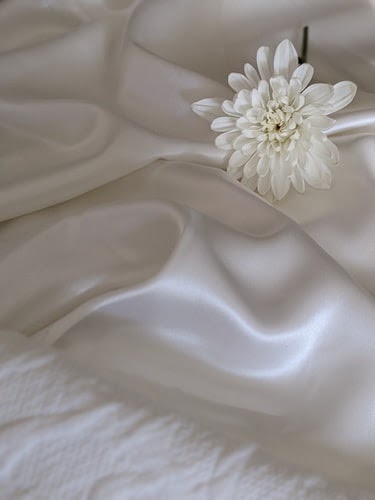Silk Pillowcases: Is It Worth the Hype?

Photo by Susan Wilkinson on Unsplash
Although they have been around for a long time, silk pillowcases seemed to have gained much more popularity over the past couple of years. Influencers and celebrities, such as the Kardashians and Cindy Crawford, endorse them and claim that it helps deliver smooth hair and clean skin, but have these benefits been proven by medical professionals?
A board-certified dermatologist and associate professor specializing in hair loss at the University of North Carolina at Chapel Hill’s School of Medicine, Amy Fox, states that because little research has been done on silk pillowcases, much of the information stated by the people using them is not necessarily true.
Pooja Sodha, a board-certified dermatologist and director of the George Washington Center for Laser and Cosmetic Dermatology in Washington, D.C. says, “There’s no harm in silk pillowcases, and there may be a benefit, but it’s not the first step that we’d take for treatment.”
So what properties does silk contain that may provide benefits claimed by others?
Because silk pillowcases are made up of continuous threads, the texture of the pillowcases is much smoother or gentle on the skin compared to other fibers such as cotton or linen. This helps prevent damage to hair and skin while sleeping.
Silk pillowcases don’t absorb much moisture and dirt, and they are also are able to regulate temperature well. These properties are most supportive of the reasons for the beauty benefits of using a silk pillowcase.
Silk pillowcases are especially beneficial to side and stomach people as well as people with curly hair.
Because the silk material is able to retain more moisture and oils, experts state that silk pillowcases are most beneficial to hair. Although they don’t necessarily prevent hair loss, they produce less friction to help your hair stay out of knots and tangles. It also helps it retain its natural oils which makes it less prone to breakage.
Sleeping on a smooth surface is likely to reduce or prevent sleep creases in your skin, but what about acne?
Mary Stevenson, a board-certified cosmetic dermatologist and assistant professor of dermatology at New York University’s Grossman School of Medicine says that the idea of silk pillowcases preventing inflammations hasn’t been studied enough to be able to support the claims. Silk pillowcases help avoid particles such as dirt and dust from coming in contact with our skin but don’t necessarily help cure acne.
Experts recommend looking at aspects in your daily routine to help ensure a healthier lifestyle before looking into purchasing a silk pillowcase. This includes improving diet, sleep, exercise, and using sunscreen to protect your skin.
If you decide to purchase a silk pillowcase, you can visit Amazon, Slip, or your local Target.




